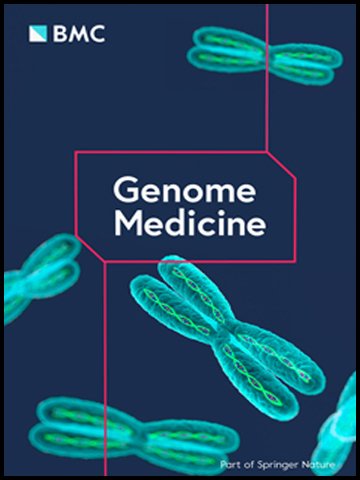代谢综合征成分的种族差异及其与肠道微生物群的关系:HELIUS 研究
IF 10.4
1区 生物学
Q1 GENETICS & HEREDITY
引用次数: 0
摘要
众所周知,代谢综合征(MetS)的发生和肠道微生物群的组成在不同种族之间存在差异,但这三个因素如何相互交织却不得而知。此外,肠道微生物群组成对 MetS 各组成部分的相对贡献是什么,以及不同种族之间是否存在差异,也是未知数。因此,我们确定了多种族 HELIUS 队列中 MetS 的发生率及其组成因素,并测试了肠道微生物群组成的整体关联性和种族关联性。我们纳入了 16209 名 HELIUS 研究中未接受过治疗的参与者,他们分别是荷兰人、非洲裔苏里南人、南亚裔苏里南人、加纳人、土耳其人和摩洛哥人后裔,以分析不同种族的 MetS 及其组成部分。在一个子集(n = 3443)中,使用线性和逻辑回归模型分析了肠道微生物群组成(16S)与 MetS 结果的关系。在不同种族中观察到 MetS 成分及其组合的流行率存在差异,而且往往与性别有关。血压升高在加纳人中尤为常见,而南亚裔苏里南人和土耳其人的 MetS 患病率普遍较高,血脂相关指标也较差。在肠道微生物群方面,如果假定与种族无关,那么α-多样性较高、几种ASV(主要与腰围和甘油三酯相关的结果)丰度较高、反刍球菌科、克里斯坦森菌科和甲烷杆菌(RCM)的ASV营养网络与较好的MetS结果相关。不过,α-多样性和 RCM 营养网络与特定种族之间存在统计学意义上的重大关联。荷兰人的相关性明显,但所有其他种族的相关性并不总是明显。在加纳人中,与其他种族相比,α-多样性和 RCM 网络丰度较高的人与高血压的测量结果呈反常的正相关。尽管对社会经济状况、生活方式和饮食相关变量的调整往往会减弱特定种族关联的效应大小和/或统计学意义,但不同结果和种族之间的总体相似模式仍然存在。不同种族间 MetS 特征的发生具有异质性。肠道微生物群与 MetS 结果之间既有独立于种族的关联,也有特定于种族的关联。因此,在对 MetS 及其与肠道微生物群的关系进行定义和/或治疗时,可以重新考虑在多个种族中采用 "一刀切 "的方法。本文章由计算机程序翻译,如有差异,请以英文原文为准。
Ethnic variations in metabolic syndrome components and their associations with the gut microbiota: the HELIUS study
The occurrence of metabolic syndrome (MetS) and the gut microbiota composition are known to differ across ethnicities yet how these three factors are interwoven is unknown. Also, it is unknown what the relative contribution of the gut microbiota composition is to each MetS component and whether this differs between ethnicities. We therefore determined the occurrence of MetS and its components in the multi-ethnic HELIUS cohort and tested the overall and ethnic-specific associations with the gut microbiota composition. We included 16,209 treatment naïve participants of the HELIUS study, which were of Dutch, African Surinamese, South-Asian Surinamese, Ghanaian, Turkish, and Moroccan descent to analyze MetS and its components across ethnicities. In a subset (n = 3443), the gut microbiota composition (16S) was associated with MetS outcomes using linear and logistic regression models. A differential, often sex-dependent, prevalence of MetS components and their combinations were observed across ethnicities. Increased blood pressure was commonly seen especially in Ghanaians, while South-Asian Surinamese and Turkish had higher MetS rates in general and were characterized by worse lipid-related measures. Regarding the gut microbiota, when ethnic-independent associations were assumed, a higher α-diversity, higher abundance of several ASVs (mostly for waist and triglyceride-related outcomes) and a trophic network of ASVs of Ruminococcaceae, Christensenellaceae, and Methanobrevibacter (RCM) bacteria were associated with better MetS outcomes. Statistically significant ethnic-specific associations were however noticed for α-diversity and the RCM trophic network. Associations were significant in the Dutch but not always in all other ethnicities. In Ghanaians, a higher α-diversity and RCM network abundance showed an aberrant positive association with high blood pressure measures compared to the other ethnicities. Even though adjustment for socioeconomic status-, lifestyle-, and diet-related variables often attenuated the effect size and/or the statistical significance of the ethnic-specific associations, an overall similar pattern across outcomes and ethnicities remained. The occurrence of MetS characteristics among ethnicities is heterogeneous. Both ethnic-independent and ethnic-specific associations were identified between the gut microbiota and MetS outcomes. Across multiple ethnicities, a one-size-fits-all approach may thus be reconsidered in regard to both the definition and/or treatment of MetS and its relation to the gut microbiota.
求助全文
通过发布文献求助,成功后即可免费获取论文全文。
去求助
来源期刊

Genome Medicine
GENETICS & HEREDITY-
CiteScore
20.80
自引率
0.80%
发文量
128
审稿时长
6-12 weeks
期刊介绍:
Genome Medicine is an open access journal that publishes outstanding research applying genetics, genomics, and multi-omics to understand, diagnose, and treat disease. Bridging basic science and clinical research, it covers areas such as cancer genomics, immuno-oncology, immunogenomics, infectious disease, microbiome, neurogenomics, systems medicine, clinical genomics, gene therapies, precision medicine, and clinical trials. The journal publishes original research, methods, software, and reviews to serve authors and promote broad interest and importance in the field.
 求助内容:
求助内容: 应助结果提醒方式:
应助结果提醒方式:


